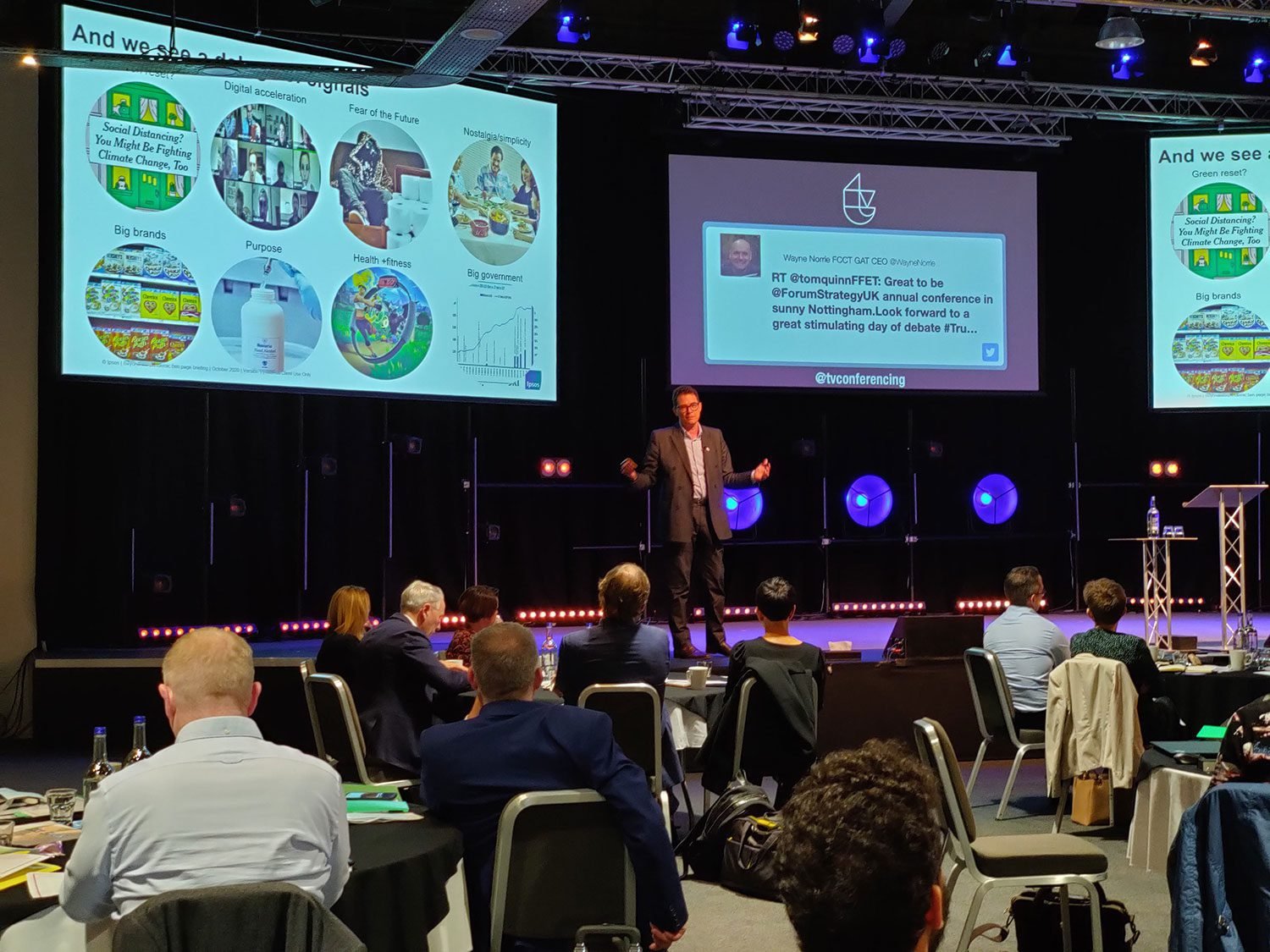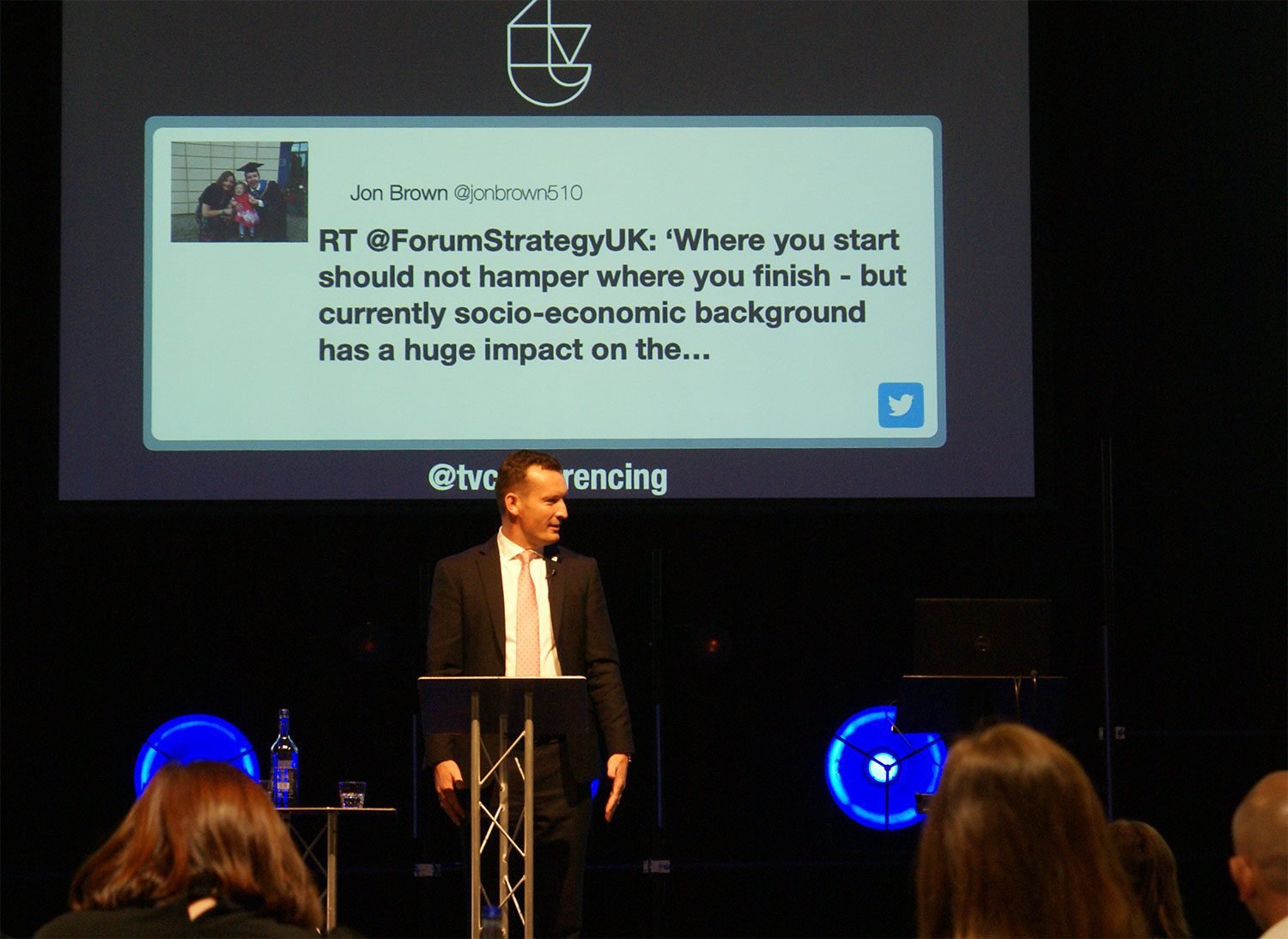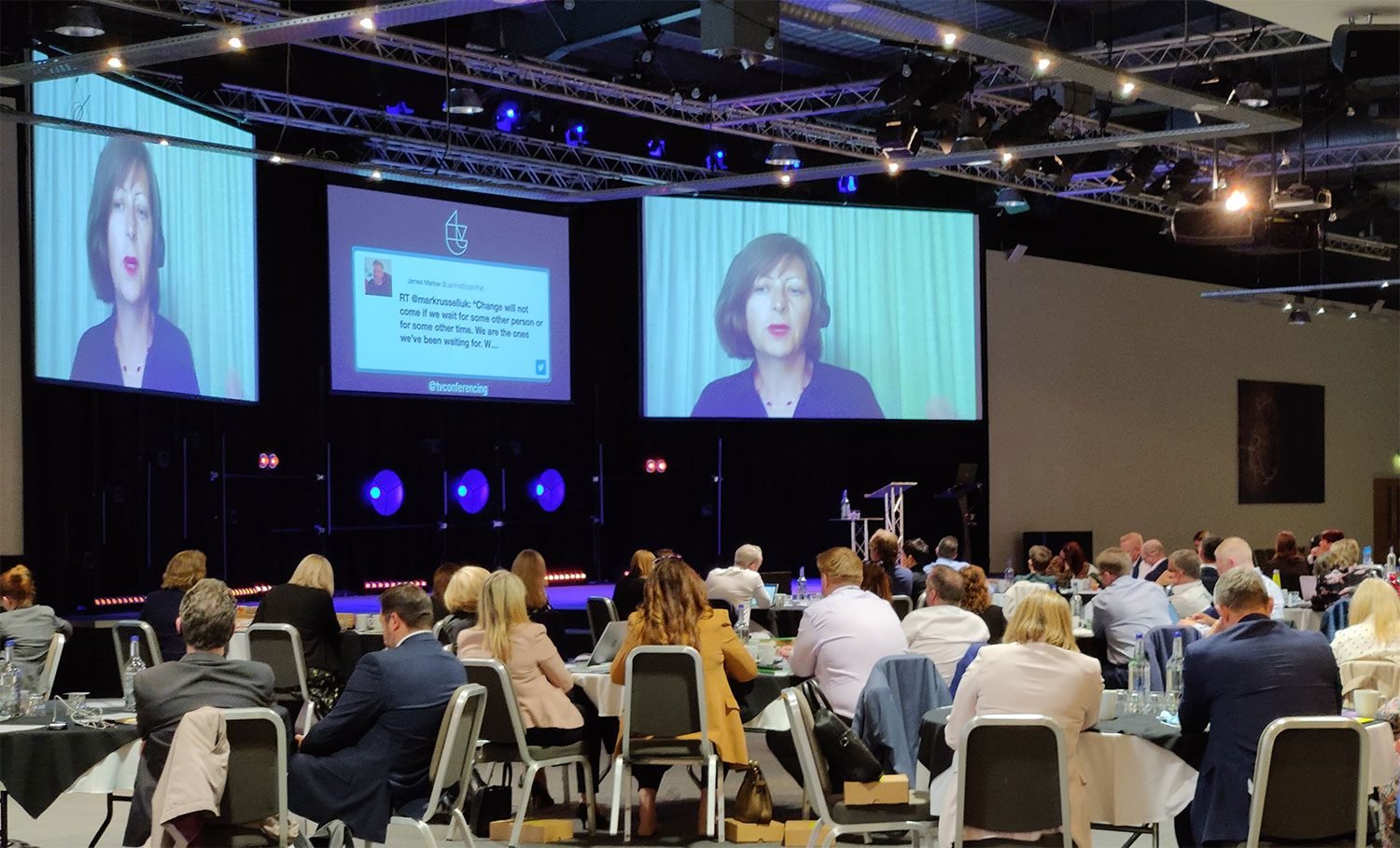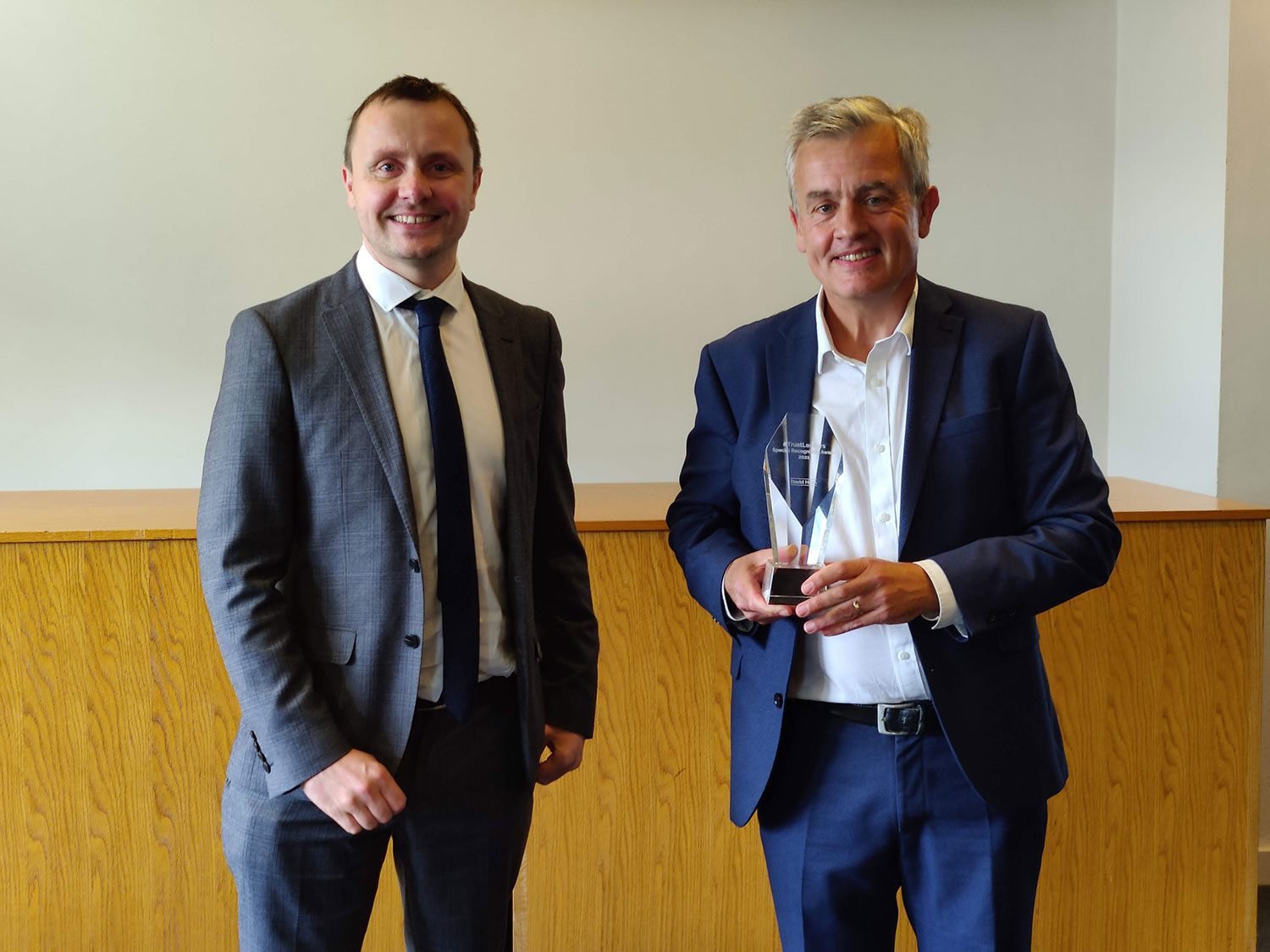Wednesday 29 September 2021 was a special day for the Forum Strategy – we were delighted, after the previous tumultuous 18 months dominated by the pandemic, to welcome over 150 delegates to this year’s National #TrustLeaders CEO Conference – the first face-to-face conference for academy trust leaders since the pandemic began. We were also pleased to welcome Maggie Farrar to Chair the day for us – a leading thinker in education and Forum Strategy Associate.
Even with the range of COVID precautions in place, the atmosphere of joy and collegiality in the room was palpable, as colleagues from across the country met again for the first time in nearly two years.
Michael Pain, Forum’s Founder and CEO, reminded colleagues of the last time they had met face-to-face in the same room, in September 2019, when the theme of the conference was the potential for academy trusts to be at the heart of their communities and for their CEOs to embody the change those communities wish to see.
These themes could not have been more pertinent to what was to come in the spring of 2020, with leaders right across the education system rising to the myriad and varying challenges of an unforeseen and ill-prepared-for pandemic. Michael commented how none of us could have predicted how much the pandemic would impact not just the education of our children and young people, but their entire lives; and very much summed up the mood of the room with the following quote:
“There is nothing like returning to a place that remains unchanged to find the ways in which you yourself have altered.” ― Nelson Mandela
Academy trust CEOs have been the vanguard of this system-wide response, often leading the response in their communities, reaching out to serve the needs of pupils and their families and offering support and resources to schools beyond their trusts as well as their own.
Michael reflected how the pandemic has brought a number of ‘big themes’ into sharp focus; issues that must be addressed if, as leaders, we are to enable the children and young people in our care to not be defined by the experiences of the last (almost) two years and consequently labelled as the ‘COVID generation’. This is not what this generation want to be remembered for or to have as their legacy – they have hopes and ambitions that look way beyond these recent events, and they and their parents and wider communities are looking to our leaders to help them realise these ambitions.
Using his keynote as a clarion call to CEO colleagues to again look outwards, rather than upwards, Michael urged them and their boards to guide their organisations to address the core issues facing this next generation of adult citizens, employees and leaders – equality, diversity and inclusion; sustainability; and becoming masters of technology.
We were privileged to once again be joined at this year’s conference by excellent speakers; passionate about their own roles and areas of expertise and excited to share their experience and ideas with delegates to help colleagues address the following four ‘big themes’ for academy trust leadership over the next year and beyond:
- Leadership
- Equality, Diversity, and Inclusion (EDI)
- Wellbeing
- Digital
Leadership
We were delighted to again welcome Saeed Atcha MBE to address colleagues; having first heard from him at our 2019 National #TrustLeaders Conference. At the time of this year’s event, Saeed was just weeks away from ending his term as Social Mobility Commissioner, but clearly remains a dedicated champion of children and young people.
Saeed emphasised that the pandemic’s greatest impact has been on children and young people but agreed with Michael that they do not wish to be defined by the pandemic and are surprisingly positive about their future. He praised trust CEOs’ “authentic” leadership and support of children, families, and their communities throughout the pandemic.
Reflecting on an increasingly challenging world, Saeed urged CEOs to put the most disadvantaged pupils and students “front and centre” in their plans, working with them to build the confidence and self-belief they will need to become successful citizens and engaging with them on their key concerns around mental health, life skills, and diversity and inclusion.
Ben Page, CEO of Ipsos MORI, then treated delegates to a whistle-stop tour of the key messages gleaned from Ipsos MORI’s plethora of data gathered over the past 12 months. He reflected on some of the huge world and societal shifts seen during the year and the change in emphasis on some of these issues, such as around climate change, diversity, and mental health. This combined data highlights new expectations of leadership in our changing society, which focus on blended and remote working, wellbeing, and equality.

Ben commented that individuals want to be part of something bigger than themselves, to feel they belong and have a purpose. Indeed, the data strongly suggests that pay does not make people happier or perform better at work; what makes the difference is the behaviour of line management towards the individual, how much they feel listened to and how performance management is undertaken.
Equality, Diversity, and Inclusion
This year’s conference was also the platform for the launch of Forum Strategy’s seminal research report – commissioned from Public First – on Equality, Diversity and Inclusion amongst academy trust CEOs.
Our COO, Alice Gregson, commented that Forum’s focus on EDI amongst trust CEOs recognises that when children from protected groups do not see ‘people like them’ in leadership roles, they notice and worry that such jobs are not for them. This generates a vicious cycle, where such children do not aspire to be leaders, so the leaders of the next generation lack diversity, and so on. The key points from the research were:
- There is general recognition that levels of diversity amongst trust CEOs and aspiring trust CEOs is poor, but there is also optimism that things have got better, particularly on gender in recent years, and that things could improve further in future.
- Experience of discrimination among leaders and trust senior management teams (SMT) is widespread.
- There was greater understanding of diversity, as a concept, than inclusion.
- There was also greater understanding around more visible protected characteristics such as gender and ethnicity than, for example, LGBTQI+ or disability, which can be harder to ‘see’ in certain instances.
- Recruitment has been identified as one of the biggest issues driving a lack of diversity in the sector.
- There are challenges around boards of trustees and governors – many leaders felt that without more diversity amongst the people in power it was inevitable that there would be implicit biases in recruitment and promotion decisions.
- There was strong support for discussing diversity issues more openly, accepting people may “say the wrong word or term”, but providing a non-judgemental environment for questions and discussion.
- There were also proposals to use more direct mentoring and coaching as a tool to build staff confidence and skills.
Wellbeing
Mark Russell, CEO of The Children’s Society (TCS) thanked colleagues for all they and their trusts and schools have done for children and young people over the previous 18 months; and issued a call to arms for their support in addressing what he called the “epidemic of unhappiness” amongst this generation. Reflecting on his own role as CEO during challenging times, Mark highlighted the following learning about his own leadership:
- It is impossible to overcommunicate during a crisis.
- Wellbeing and mental health must be prioritised.
- Equality, diversity, and inclusion (EDI) must also be a priority.
- Your organisational culture is about how your team feels; and is also set by the worst behaviour you tolerate as a leader.
- As a leader, do not ever be ashamed to say you have done a good job.
Mark commented that leaders must support their organisations to be resilient, by modelling how they develop and sustain their own resilience.

Bringing an international perspective on the issue of CEOs’ wellbeing were LeeAnn Mallory and Amanda Dudley from the USA, who discussed with colleagues their ‘Be Well Lead Well’ assessment, which they had been inspired to establish due to their interest in the link between CEO wellbeing and effectiveness. They commented that individuals cannot separate their personal lives and wellbeing from their success at work, so “the more we bring our whole selves into our work, the more effective we are as leaders”.
LeeAnn and Amanda encouraged colleagues to consider how they role-model wellbeing in their own trusts; and to use the ‘Be Well Lead Well’ assessment to help them see where they might need to focus more attention. The assessment is offered (since October 2021) by Schools Advisory Service to all Forum Strategy members as part of their overall membership package.
Digital
The pandemic has shone a spotlight on the stark digital divide between the most and least disadvantaged children and young people in our schools, trusts and right across the education system.
We were therefore privileged to hear from Liz Williams MBE, Social Mobility Commissioner and CEO of FutureDotNow, on the current context for social mobility and how digital strategy might provide opportunities for closing the digital gap.

Liz commented that social mobility is, in simple terms, about where you start and where you finish; and is very much about the opportunities that are open to you as an individual throughout your life – “talent is everywhere, opportunity is not”. She reflected on how children and young people from disadvantaged backgrounds have been hardest hit by the pandemic; and whilst businesses made three years of digital progress during the first three months of the pandemic, at the same time the digital and data poverty of children and families was brought into sharp focus with the rapid move to remote teaching and learning. Whilst those children with digital skills and confidence and access to a device and a connection were quickly able to adapt, many pupils had no access at all and were once again left behind.
Liz suggested that digital skills and confidence are rapidly becoming essential to most current jobs and by 2030 are likely to be the most widespread ‘under-skill’ in the economy.
Professor Paul Howard-Jones built on this theme when he engaged with colleagues on the evolving neuroscience of learning and working and reflected that digital learning involves the same processes in the brain as face-to-face learning.

Paul commented that online learning and gaming are not inherently bad for children and young people, if they are underpinned by an understanding of how the brain learns, how it responds to rewards and, crucially, how this is all affected by brain development during each stage of their education.
In conclusion
Drawing the conference to a close, Maggie Farrar reflected on the richness of the learning colleagues had experienced, and the value of being together in the same room to network and discuss this learning in the context of their own trusts and schools.

Indeed, it was in recognition of this spirit of collaboration and professional generosity that led Forum Strategy to present our 2021 #TrustLeaders Special Recognition Award to David Horn – recently retired long-standing CEO of the Beckfoot Trust – whose generosity and commitment to securing success for all pupils helped inspire the culture of collaborative improvement between schools that is now widespread in the trust system.
We look forward to next year’s National CEO Conference, which takes place on 22nd September 2022. Meanwhile the first National #TrustLeaders Symposium (also open to our COO and Education Executive members) takes place on 8th June 2022 in Nottingham.
Watch the highlights
You can watch the highlights and some of the speakers from the 2021 conference by clicking the button below.

